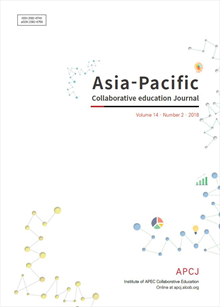간행물
Asia-Pacific Collaborative education Journal

- 발행기관 APEC국제교육협력원
- 자료유형 학술지
- 간기 반년간
- ISSN 2092-674X (Print)2092-6758 (Online)
- 수록기간 2004 ~ 2021
- 주제분류 사회과학 > 교육학 사회과학 분류의 다른 간행물
- 십진분류KDC 371DDC 379
권호리스트/논문검색
Volume 11 Number 1 (2015년 6월) 6건
Research Article
1.
2015.06
구독 인증기관 무료, 개인회원 유료
The purposes of this inquiry were to seek the multicultural awareness of students at homogeneously and heterogeneously populated schools in the Municipality of Sungai Penuh, Jambi, Indonesia. Data were collected through administrating the adapted version of Multicultural Awareness Scale to 334 students from one homogeneously populated senior high school and one heterogeneously populated madrasah aliyah (Islamic senior high school). Data were analyzed by using Rasch Analysis and tests of inferential statistics. The results of data analyses indicated that 1) the students had a relatively high multicultural awarness, 2)the examination on the map of item endorsabilty indicated that the students had high cultural awareness but low self-awareness, 3) the students at the heterogeneously populated madrasah aliyah had a higher multicultural awareness than their counterparts at the homogeneously populated senior high school, and 4) no statistically significant differences were found in the comparisons of the students’ awareness across the demographic variables across and within the same school. Policy implications and suggestions for future research are also discussed.
4,900원
2.
2015.06
구독 인증기관 무료, 개인회원 유료
The study investigated the relationship between parental attention, educational experience and criminal behaviour of students in Borstal Institutions. The purpose was to improve the quality of parent-child relationships and reduce juvenile criminality in Nigeria. The study adopted a descriptive correlation type survey. The target population consisted of 1,394 juvenile offenders who were housed at the Borstal Institutions. The sample comprised of 450 participants who were randomly selected using a balloting (hat and draw) method of simple random sampling. Two researcher-constructed instruments were used in the study, namely: a “Criminal Behaviour Questionnaire (CBQ)” and a “Parental Attention & Educational Experience Questionnaire (PAEEQ)”. Data was analysed using the Pearson Product Moment Correlation statistical method. The findings revealed that a significant relationship existed between parental attention and criminal behaviour; and between educational experience and criminal behaviour of students in Borstal Institutions.Itwas concluded that adequate parental love, warmth, care, attention are imperative for effective parenting and child rearing.
4,000원
3.
2015.06
구독 인증기관 무료, 개인회원 유료
The Ethiopian development plans have dealt with the education sector as a key strategic pillar. There have been a lot of educational efforts. In particular, to cope with a lack of qualified teachers, lack of good teaching models, and remote rural regions separated from educational benefits, the Ethiopian Ministry of Education has made efforts to utilize educational media, such as satellite TV programing, to improve the quality of secondary education for last decade. However, there was lack of national investigation in the aspect of systemic evaluation to measure the effectiveness of the satellite TV programing. This study aims to investigate the actual practice and effectiveness of the satellite TV programing in Ethiopian secondary schools. To achieve the goal, one questionnaire was developed based on the CIPP model. Two secondary schools were selected and 228 students (Grade 9-12) participated in the survey. Data collected from them were utilized for descriptive & frequencies analysis, chi-square test, and multiple regression analysis. The results indicated that Ethiopian students utilizing satellite TV programing scored highly in the evaluation areas of context, input, process, and product of the program. It was also found that learning demand, learning content, and class management were factors affecting the satisfaction in the satellite TV programing. These findings suggested that satellite TV programing could play an important role in improving the quality of Ethiopian secondary education. As a conclusion, several educational and administrative strategies to improve the TV program were recommended.
4,600원
4.
2015.06
구독 인증기관 무료, 개인회원 유료
The relevance of gender equality to the development process underscores the need for creating opportunities for girls and women to have access to all levels of education – primary, secondary and tertiary. Women require formal education for self and national development. Since Nigeria has a significant population of girls and women, it is imperative that their education is given a pride of place. This paper examines the policies that have been made to promote the education of girls and women at the three levels of education (basic, post-basic and tertiary) in Nigeria, and the situation of girl-child and women’s education in the country. The paper also discusses the challenges confronting education of girls and women, such as high number of out-of-school children caused by child labor practices, early marriage and teenage pregnancy; inadequate female participation rates in higher education; etc. Some actions that could be taken to address the challenges are recommended. These include equalizing access to quality education, provision of welfare support for pupils/students, the establishment of an open school system, enforcing laws on compulsory school attendance at the basic education level, economic empowerment of women, and the promotion of science and technological education among women.
4,900원
5.
2015.06
구독 인증기관 무료, 개인회원 유료
This paper will compare two instruments for quality assurance on the internationalization of higher education institutions: The Internationalization Quality Review Process (IQRP) and the International Education Quality Assurance System (IEQAS). Methodologies adopted were ethnography, hermeneutical phenomenology and the cross-cultural comparative approach. Findings show that IQRP was more comprehensive than IEQAS. Three domains -- the nature of the quality assurance, procedural aspect and rewards and sanctions -- were selected, contrasted, compared and analyzed. During the analysis of sanctions, a discernable concept, equity was derived from the IEQAS and an in-depth analysis was undertaken to reveal and interpret the nature of the meaning.
5,800원

